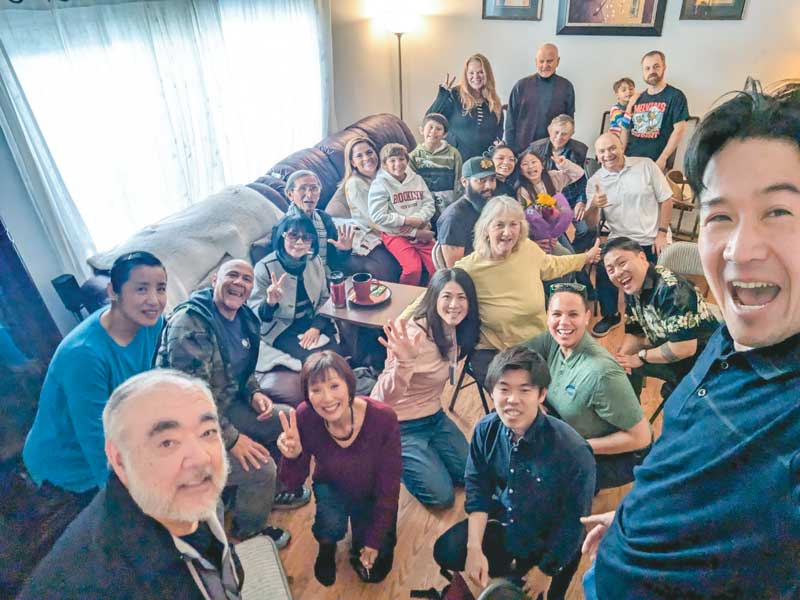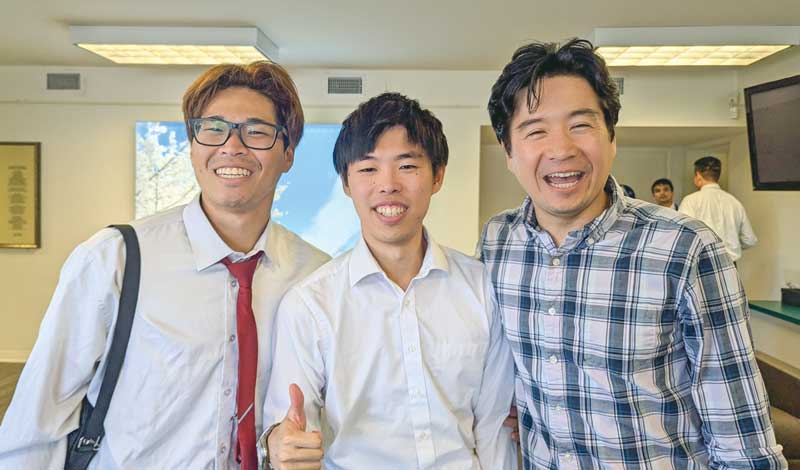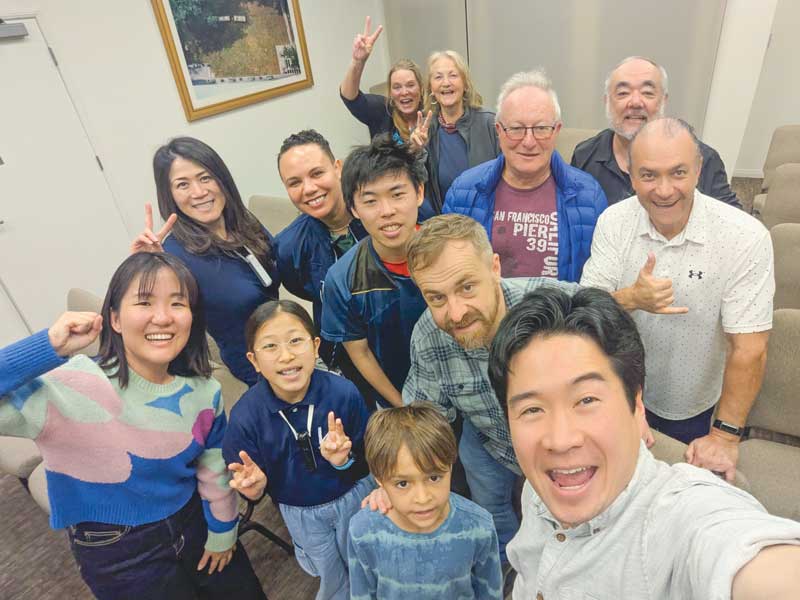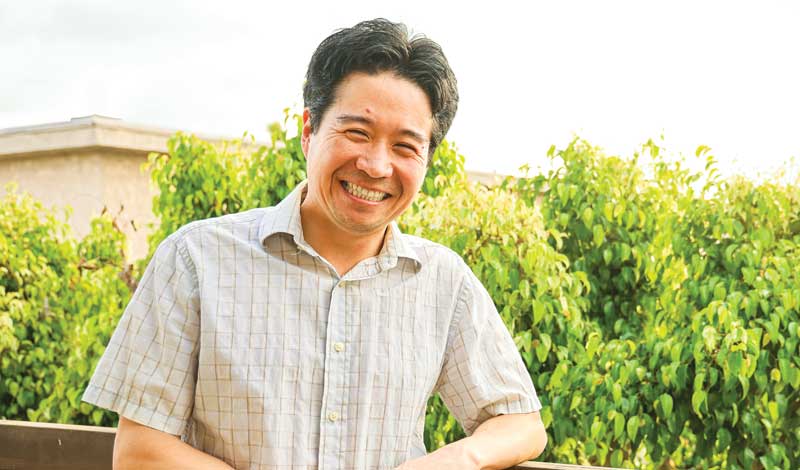Living Buddhism: Thank you for sharing your story with us. This year, your Buddhist practice has helped you become a pillar of your community. But that wasn’t always the case.
Jun Koizumi: Not at all. When I was in college, I was visited by a young men’s leader who took very good care of me. I came to expect warm encouragement, but one day, he stunned me with sudden strictness. “Jun,” he said, “it’s time for you to take responsibility for your own happiness. Nothing will change in your life unless you change.”
My family moved to the U.S. when I was 6. I had two sisters, the youngest just a newborn. My parents practiced Buddhism, and I watched them overcome many challenges including raising three kids in a foreign land. Although I attended SGI meetings and chanted Nam-myoho-renge-kyo, I hadn’t yet made the practice my own.
What do you mean by that?
Jun: I thought, The SGI members are chanting for me so I don’t have to worry about anything. I didn’t understand yet that I had to fight for my own happiness.
To be honest, when my leader gave me that guidance, I was dealing with a lot. I was in college in Irvine, California, but back home, in Torrance, my family was going through severe financial difficulties and was on the verge of homelessness. I still faced three more years of taking out loans to finish college. I was also having a hard time fitting in with my peers and was getting bullied because I didn’t speak up.
My young men’s leader’s words made me reflect: What does it mean to practice for my happiness? I couldn’t just depend on others to carry me. I had to develop my own foundation in faith.
Did you see any changes in your life after that?
Jun: On the surface, things didn’t change, but my attitude completely shifted. I started searching for meaning in my environment, asking questions, sharing openly. I began to see a greater sense of mission in everything—my studies, my own struggles and the struggles of those around me.
How did that affect your daily life?
Jun: I started to think more about how I could give back to the community. Watching the news, I knew that within a 10-mile radius from home, people were struggling with homelessness, violence and poverty. I had never been exposed to any of that before. I wanted to widen my perspective and make a difference.
After I graduated with a degree in criminology, I worked for a year and then moved home to Torrance, where I became a district young men’s leader for the first time. It was a concrete way to give back to the SGI, and it felt good to be home, with the people who watched me grow up. I focused on creating joy in our district and supporting our two youth. One was in elementary school and the other was in middle school. I learned how to truly take care of others by supporting them in faith. What were they going through? How can I really get to know them and help them become happy?
It started with building rapport and trust, calling them to say “Hi,” and have a simple conversation, even if they didn’t want to talk.
As I took on more responsibility in the SGI, it became apparent to me how deeply interconnected our lives are. Supporting others strengthened my life force. Learning about others’ struggles and empathizing with them was helping me become a better person. Our lives were interdependent, I realized, and we could influence our environment.
I wasn’t there to tell them how they should practice or how to solve their problems. I was there to help them see their potential and believe in them until they could believe in themselves.
Where did you learn that spirit?
Jun: From Ikeda Sensei. Early in my practice, I read this quote:
Even if you think you’re hopeless and incapable, I know you’re not. I have not the slightest doubt that each of you has a mission. Though others may disparage you, please know that I respect you, I believe in you. No matter what circumstances you now face, I have absolute confidence that a wonderful future awaits you. (Discussions on Youth, p. 27)
Time and again, this quote has helped me restore my faith in the potential of human beings and in myself.

We understand that you went on to become a public service worker for the elder population. How did Sensei’s guidance apply to you work?
Jun: I work for the county, overseeing conservatorships for people who are unable to make informed healthcare and financial decisions. Most suffer from neurocognitive impairments, such as Alzheimer’s disease or dementia, and have been exploited by family members. They in essence have no one left.
It can be tough. I care for people who often don’t want help. Some lash out. Many have given up on trust. But I never give up on them.
I know there is a way to orient my life with theirs, to be a positive influence. This is what I’ve learned through my Buddhist practice.
In the mornings, I pray to bring forth compassion to interact with each person sincerely. I chant for their safety and well-being. In front of the Gohonzon every day is where I chant for myself, my family, my friends and everyone in the community that I care for.
That became especially important earlier this year. Can you tell us about that?
Jun: Yes. I cover all of L.A. County, from Lancaster to Catalina Island, which spans about 100 miles. When the wildfires hit Altadena in January, I immediately thought of my clients in that area. Four were in the heart of the fire zone. Six more were affected by the smoke and in the evacuation zone.
I had to track each of them down. Many were evacuated to different facilities, but I had no way of contacting them. For days, I was driving from shelter to shelter, desperately trying to find them. When I did locate them, I worked extensively with the multidisciplinary team to ensure that they were provided with the essentials that they needed to sustain their lives. Many of them required medications and a higher level of care.
The devastation was overwhelming, and at one point, I couldn’t muster hope. I couldn’t see how to break through.

What helped you find hope again?
Jun: My clients did. When I met with each person, I was first at a loss for the right words to encourage them. All I could do was confirm they were OK. But I sincerely chanted for them to feel my heart. Despite losing everything and having no other source of support, they expressed their gratitude for my regular visits.
One shared: “I’m not worried; I know you’ve got my back.” Another told me, “Thanks for coming to see me. I only have you right now.”
Again, they are neurocognitively impaired. They don’t often have the capacity to verbalize things to me in a way that I understand, which made these encounters incredibly meaningful. That’s when I felt confident: I was making a difference. That gave me strength.
What have you learned through this?
Jun: People are the essence of the community. Our bonds with others create unity from which springs the transformative force that brings shared joy. And we can make a direct impact on people’s lives through our sincere care for others. That spirit continues to guide me in my work, in the SGI and with friends and family.
When I was deputized with the county, we were asked to care for our clients like we would our own family. This is the same spirit that Sensei has in his interactions with others and how I want to live.
There were many conversations I had with my clients that were as simple as finding out their favorite foods or hobbies or what they used to do for work. But I was building bridges of trust with individuals who often felt forgotten.
I felt a renewed determination to carry out Sensei’s words:
The problems confronting humankind are daunting in their depth and complexity. While it may be hard to see where to begin—or how—we must never give in to cynicism or paralysis. We must each initiate action in the direction we believe to be right. We must refuse the temptation to passively accommodate ourselves to present realities but must embark upon the challenge of creating a new reality. (“Peace Through Dialogue: A Time to Talk,” 2000 Peace Proposal)

How has this experience impacted your efforts in your district?
Jun: The same month as the fires, we had a successful chapter kickoff event at a neighborhood community center, where we had heartfelt dialogues with venue staff and neighbors about our Buddhist practice. The following month, we appointed two group leaders who are actively involved in reinvigorating the district. Three men’s leaders in the district joined the King Castle Group (the men’s division safety and security group for our Buddhist centers), and we have been supporting the center to build our inner strength and serve our community. Furthermore, our newly appointed district young men’s leader took a courageous step in introducing the practice to his co-workers and friends, showing them how Buddhism can transform their lives.
What do you hope for the future?
Jun: I’m looking forward to embracing the joys and challenges of my life and keep developing myself to become a better person. I want to help others find their own strength, just like I did. One dialogue at a time, I’ll strive to make a positive impact on my community.
As a district men’s leader, I want to continue to inspire the men and young men to take full responsibility for their own happiness and build vibrant and supportive communities. The SGI-USA’s themes of friendship and community are more than a catchphrase. It’s a mission I’m proud to advance.
You are reading {{ meterCount }} of {{ meterMax }} free premium articles

